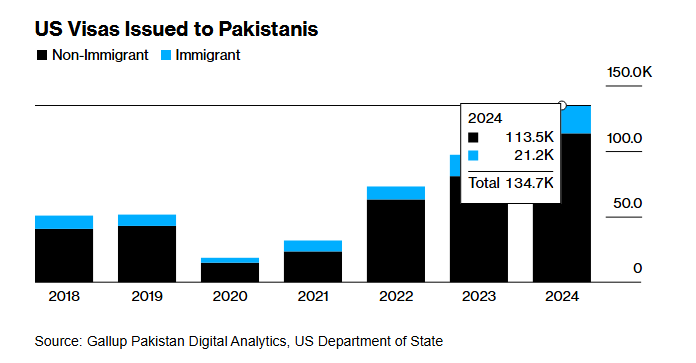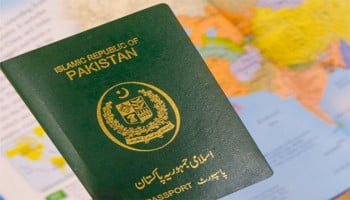
Pakistan’s economic crisis has caused a record departure of skilled workers, creating serious gaps in essential industries like healthcare, finance, and technology.
Economist Asad Ejaz Butt, who previously held senior roles, is one of many who have left. “Passion to do something for the country was subdued by this economic responsibility and by salaries constantly being beaten by growing inflation,” Butt told Bloomberg, describing how rising costs dampened his commitment to serving Pakistan.
This trend is widespread across Pakistan, where more than a million professionals from sectors such as healthcare, finance, and technology have emigrated over the last three years.
Essentials like cars and air conditioners are now priced similarly to those in Europe, pushing salaries past their limits. According to a recent survey, nearly 40% of Pakistanis want to move abroad, and the demand for US visas is at a record high.

“There’s a difference between people wanting to leave for better opportunity and people desperate to leave because there’s nothing left,” said Veqar Islam, CEO of JBS, a prominent tech company.
Many companies in Pakistan’s tech and finance sectors are struggling to keep employees, even with significant perks. TPL Corp., which operates in insurance, real estate, and venture capital, now pays some senior employees partially in US dollars and offers travel benefits for regional roles.
Some businesses are spending more than their budgets to stay competitive, but this strategy may not last. “Can organisations in an economic downturn give this kind of an increment? The answer is no,” Islam told Bloomberg.
Remittances from Pakistanis abroad send about $30 billion home each year, which helps the economy temporarily. However, financial analyst Mohammed Hunain, now working in Saudi Arabia, expressed concerns for young Pakistanis who are earning less compared to their regional peers while facing the highest inflation in the area. “It’s very alarming and difficult to make ends meet,” Hunain said.
To manage this emigration, the government recently increased taxes on high earners as required by a new International Monetary Fund (IMF) agreement. However, this may risk pushing more top professionals out of the country.
Acknowledged this challenge, State minister for Finance Ali Pervaiz Malik said: “Talent leaving is something that we must be cognizant of.”
Despite government optimism for recovery, Butt, now in Massachusetts, remains doubtful. “I have to be more practical, more reasonable with my decision-making, even though I still have those emotions for my country,” he admitted, concerned that Pakistan’s current economic instability makes it too risky to return anytime soon.
















